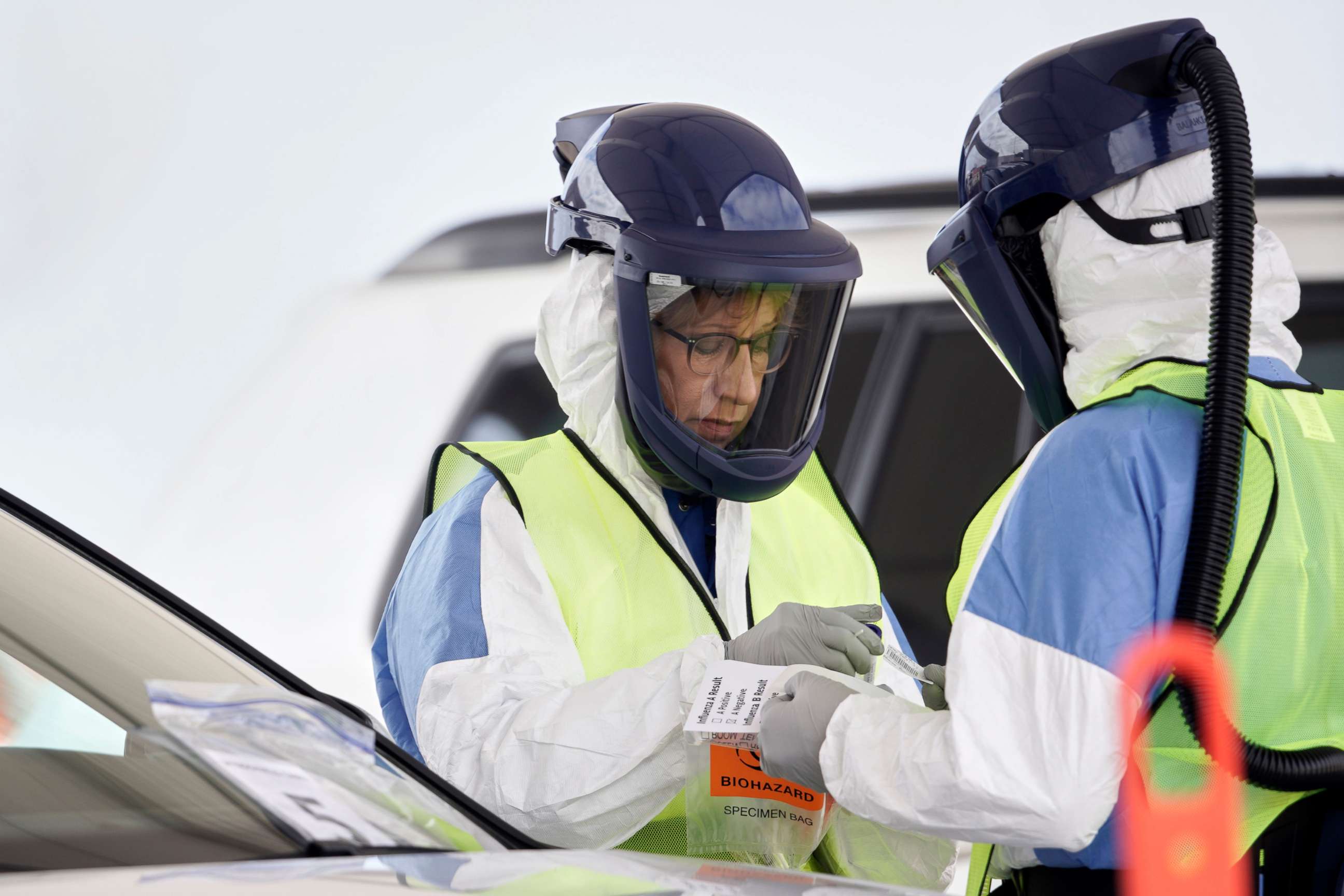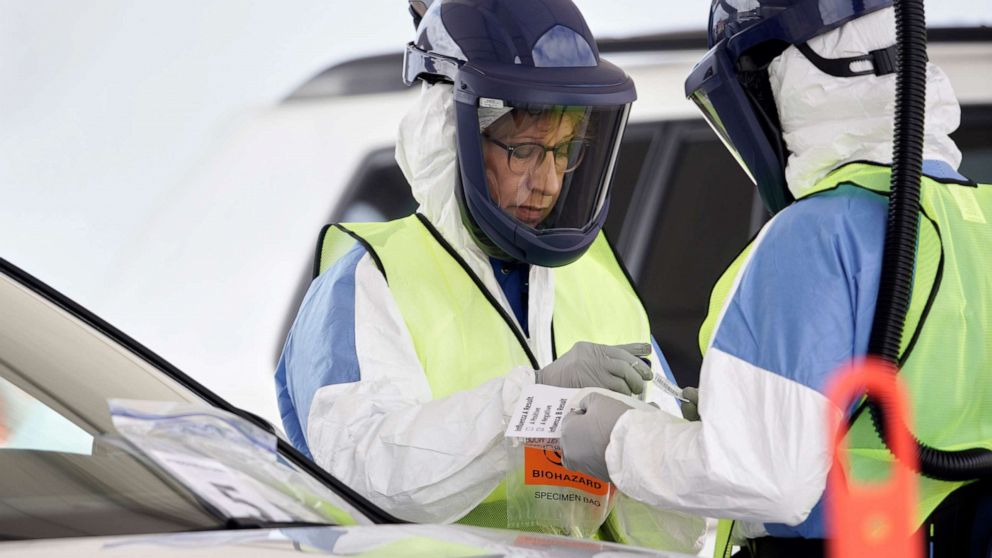Blood tests could help battle COVID-19 in US
With a limited supply of COVID-19 tests in the United States, people with mild symptoms are less likely to be tested, leaving many in the dark as to whether cold-like symptoms two weeks ago were just the sniffles or a mild case of novel coronavirus.
But that could soon change. Scientists are racing to develop a blood test that could detect COVID-19 as well as determine which individuals may be immune to it.
This blood-based methodology, called serology testing, also is referred to as antibody testing. According to experts, antibody tests will be helpful even as COVID-19 cases decline because they can determine how much of the population actually was exposed in the first place.
"It tells you that a person was infected with the virus" in the past, said Robert F. Garry, Ph.D., director of the Tulane Center of Excellence, Global Viral Network. "At some point when this is over, we want to go back and see how many people are infected in the community."

Antibody testing techniques, which identify the body's immune response to infections, already are used to detect other infectious diseases including HIV. When a person is infected with a foreign agent, such as the novel coronavirus, that person's immune system produces infection-fighting proteins called antibodies. Antibody tests identify those proteins, which circulate in the blood long after the infection has passed.
Unlike tests being used today in the United States, which identify COVID-19 in patients who are currently sick, antibody tests would reveal whether a person had ever been infected -- even long after recovering.
Instead of requiring a nasal swab or spit kit, antibody tests need just a small blood sample. Such tests also are relatively inexpensive and can produce results in about 15 minutes.
What to know about Coronavirus:
- How it started and how to protect yourself: Coronavirus explained
- What to do if you have symptoms: Coronavirus symptoms
- Tracking the spread in the US and Worldwide: Coronavirus map
Antibody tests can help guide scientific research and health policy. For example, since a positive antibody test confirms a person was exposed and survived the virus, this test could allow people to confidently go "back to work, or perhaps be employed in the clinical setting to care for patients," Garry said.
Detecting immunity, particularly among health care workers and first responders, may permit them to avoid quarantine and more effectively treat the surge of COVID-19 patients that's overwhelming facilities.
Tune into ABC at 1 p.m. ET and ABC News Live at 4 p.m. ET every weekday for special coverage of the novel coronavirus with the full ABC News team, including the latest news, context and analysis.
Beyond diagnostic capabilities, serology tests potentially also could inform vaccine and treatment development by giving researchers more data on how the immune system responds to COVID-19. People who've had the virus and recovered possibly could donate antibodies to those still sick, aiding in their recovery.
Dr. Carlos Cordon, a professor and the chair of pathology, molecular and cell-based medicine at the Icahn School of Medicine at Mt. Sinai, said it's imperative to continue developing these tests.
"We need to identify who has had this virus," he said. On top of that, Cordon said people who've recovered from COVID-19 may "have a lot of antibodies" so they could be potential donors, referring to a promising potential treatment called convalescent plasma. "We can isolate some of these antibodies to donate to those that are very sick."
Serology testing is not yet widely available in the United States. New York Gov. Andrew Cuomo earlier this week called on the Food and Drug Administration to "immediately" approve these tests, after which White House coronavirus response coordinator Dr. Deborah Birx told reporters such tests wouldn't be available for "a couple weeks."
The FDA already gave a green light for certified labs to start using the tests in a limited way because of the public health emergency. Right now, serology tests are allowed as long as they're used only in hospitals and clinics, and as long as the laboratory has been approved by the Centers for Medicaid and Medicare Services. The FDA also has required companies and labs to apply for Emergency Use Authorization, or EUA.
Laboratories across the U.S. are working on their own tests, including Mount Sinai's Icahn School of Medicine in New York, which recently published a preprint paper about its test. At least 17 companies have notified the FDA about beginning to market and distribute serologic tests to labs and clinics across the U.S.
A company called United Biomedical pledged to offer free antibody tests in Telluride, Colorado, with plans to test everyone. Another company, BioMedomics, told ABC News it's seen "overwhelming" demand for its COVID-19 antibody test. Meanwhile, the British government said citizens will soon be able to order at-home serology kits to test for COVID-19 in the privacy of their living rooms.

Other countries, like China, already have implemented widespread antibody testing. One reason China was ahead of the curve in developing these tests is because the outbreak began there, and antibody testing development relies on blood samples from people who've recovered.
"China had about a month or so on the rest of us to where they did have access to a lot of survivors, and certainly a large incentive" to develop treatments, added Garry. "Like in New Orleans here, our first patient showed up about March 9. That's barely enough time to just start a serological response."
Serology testing also has advanced more slowly than conventional PCR testing because the science behind it is, at least in some ways, more complex. But, Garry said, there's nothing controversial about the pace at which serology testing is moving in the United States, and it's appropriate that scientists, companies and regulators take their time to make sure the tests are accurate, avoiding false positives.
"There are several seasonal coronaviruses that cause the common cold," Garry added. "Not every person that shows a serological reaction to coronavirus has been infected with SARS COV-2."
Eden David, who's studying neuroscience at Columbia University and matriculating to medical school later this year, is a contributor to the ABC News Medical Unit. Sony Salzman is the unit's coordinating producer.




